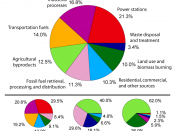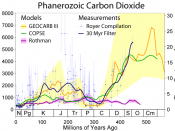Global Warming
According to the National Academy of Sciences, the Earth's surface temperature has risen by about 1 degree Fahrenheit in the past century, with accelerated warming during the past two decades. There is new and stronger evidence that most of the warming over the last 50 years is attributable to human activities. Human activities have altered the chemical composition of the atmosphere through the buildup of greenhouse gases - primarily carbon dioxide, methane, and nitrous oxide. The heat-trapping property of these gases is undisputed although uncertainties exist about exactly how earth's climate responds to them.
Energy from the sun drives the earth's weather and climate, and heats the earth's surface; in turn, the earth radiates energy back into space. Atmospheric greenhouse gases (water vapor, carbon dioxide, and other gases) trap some of the outgoing energy, retaining heat somewhat like the glass panels of a greenhouse. Without this natural "greenhouse effect," temperatures would be much lower than they are now, and life as known today would not be possible.
Instead, thanks to greenhouse gases, the earth's average temperature is a more hospitable 60ðF. However, problems may arise when the atmospheric concentration of greenhouse gases increases.
Since the beginning of the industrial revolution, atmospheric concentrations of carbon dioxide have increased nearly 30%, methane concentrations have more than doubled, and nitrous oxide concentrations have risen by about 15%. These increases have enhanced the heat-trapping capability of the earth's atmosphere. Sulfate aerosols, a common air pollutant, cool the atmosphere by reflecting light back into space; however, sulfates are short-lived in the atmosphere and vary regionally.
Scientists generally believe that the combustion of fossil fuels and other human activities are the primary reason for the increased concentration of carbon dioxide. Plant respiration and the decomposition of organic matter release more than 10 times the...



....here this mite help ...
MAYBE IF U MAKE MORE EXCUTING IT WOULD BE BETTER..
1 out of 2 people found this comment useful.